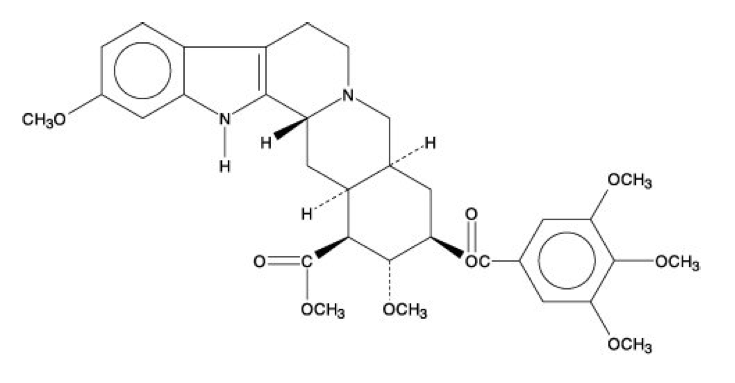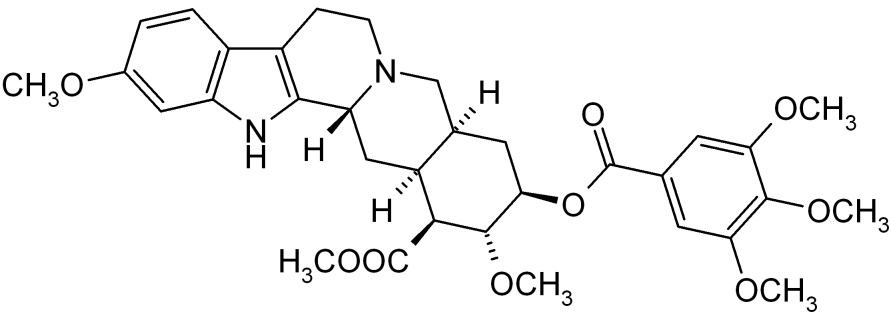Reserpine: Difference between revisions
Gerald Chi (talk | contribs) mNo edit summary |
Gerald Chi (talk | contribs) mNo edit summary |
||
| Line 180: | Line 180: | ||
|drugInteractions= | |drugInteractions= | ||
* | * MAO inhibitors | ||
:* | :* MAO inhibitors should be avoided or used with extreme caution. | ||
* Tricyclic antidepressants | |||
:* Concurrent use of tricyclic antidepressants may decrease the antihypertensive effect of reserpine. | |||
* Reserpine and sympathomimetics | |||
:* Concurrent use of reserpine and direct-or-indirect acting sympathomimetics should be closely monitored. The action of direct-acting amines (epinephrine, isoproterenol, phenylephrine, metaraminol) may be prolonged when given to patients taking reserpine. The action of indirect-acting amines (ephedrine, tyramine, amphetamines) is inhibited. | |||
:* Reserpine should be used cautiously with digitalis and quinidine, since cardiac arrhythmias have occurred with rauwolfia preparations. | |||
:* Concomitant use of reserpine with other antihypertensive agents necessitates careful titration of dosage with each agent. | |||
<!--Use in Specific Populations--> | <!--Use in Specific Populations--> | ||
Revision as of 22:43, 4 July 2014
Editor-In-Chief: C. Michael Gibson, M.S., M.D. [1]; Associate Editor(s)-in-Chief: Gerald Chi
Disclaimer
WikiDoc MAKES NO GUARANTEE OF VALIDITY. WikiDoc is not a professional health care provider, nor is it a suitable replacement for a licensed healthcare provider. WikiDoc is intended to be an educational tool, not a tool for any form of healthcare delivery. The educational content on WikiDoc drug pages is based upon the FDA package insert, National Library of Medicine content and practice guidelines / consensus statements. WikiDoc does not promote the administration of any medication or device that is not consistent with its labeling. Please read our full disclaimer here.
Overview
Reserpine is a catecholamine-depleting sympatholytic that is FDA approved for the {{{indicationType}}} of mild essential hypertension. Common adverse reactions include abdominal pain, diarrhea, nausea, vomiting, xerostomia, dizziness, headache, lethargy, somnolence, vertigo, depression, and nasal congestion.
Adult Indications and Dosage
FDA-Labeled Indications and Dosage (Adult)
Mild Essential Hypertension
- Dosing Information
- Initial Dosage
- In the average patient not receiving other antihypertensive agents, the usual initial dosage is 0.5 mg daily for 1 or 2 weeks.
- Maintenance Dosage
- For maintenance, reduce to 0.1–0.25 mg daily.
- Higher dosages should be used cautiously, because occurrence of serious mental depression and other side effects may increase considerably.
Psychiatric Disorders
- Dosing Information
- Dosage
- The usual initial dosage is 0.5 mg daily, but may range from 0.1 mg to 1.0 mg. Adjust dosage upward or downward according to the patient's response.
- Reserpine is also useful as adjunctive therapy with other antihypertensive agents in the more severe forms of hypertension; relief of symptoms in agitated psychotic states (e.g., schizophrenia), primarily in those individuals unable to tolerate phenothiazine derivatives or in those who also require antihypertensive medication.
Off-Label Use and Dosage (Adult)
Guideline-Supported Use
There is limited information regarding Off-Label Guideline-Supported Use of Reserpine in adult patients.
Non–Guideline-Supported Use
There is limited information regarding Off-Label Non–Guideline-Supported Use of Reserpine in adult patients.
Pediatric Indications and Dosage
FDA-Labeled Indications and Dosage (Pediatric)
- Reserpine is not recommended for use in children.
- If it is to be used in treating a child, the usual recommended starting dose is 20 µg/kg daily. The maximum recommended dose is 0.25 mg (total) daily.
Off-Label Use and Dosage (Pediatric)
Guideline-Supported Use
There is limited information regarding Off-Label Guideline-Supported Use of Reserpine in pediatric patients.
Non–Guideline-Supported Use
There is limited information regarding Off-Label Non–Guideline-Supported Use of Reserpine in pediatric patients.
Contraindications
- Hypersensitivity
- Mental depression or history of mental depression (especially with suicidal tendencies)
- Active peptic ulcer
- Ulcerative colitis
- Electroconvulsive therapy
Warnings
- Extreme caution should be exercised in treating patients with a history of mental depression. Reserpine may cause mental depression. Recognition of depression may be difficult because this condition may often be disguised by somatic complaints (masked depression). The drug should be discontinued at first signs of depression such as despondency, early morning insomnia, loss of appetite, impotence, or self-deprecation. Drug-induced depression may persist for several months after drug withdrawal and may be severe enough to result in suicide.
Precautions
- General
- Since reserpine increases gastrointestinal motility and secretion, it should be used cautiously in patients with a history of peptic ulcer, ulcerative colitis, or gallstones (biliary colic may be precipitated).
- Caution should be exercised when treating hypertensive patients with renal insufficiency, since they adjust poorly to lowered blood pressure levels.
- Preoperative withdrawal of reserpine does not assure that circulatory instability will not occur. It is important that the anesthesiologist be aware of the patient’s drug intake and consider this in the overall management, since hypotension has occurred in patients receiving rauwolfia preparations. Anticholinergic and/or adrenergic drugs (e.g., metaraminol, norepinephrine) have been employed to treat adverse vagocirculatory effects.
Adverse Reactions
Clinical Trials Experience
There is limited information regarding Clinical Trial Experience of Reserpine in the drug label.
Postmarketing Experience
- The following adverse reactions have been observed with rauwolfia preparations, but there has not been enough systematic collection of data to support an estimate of their frequency. Consequently the reactions are categorized by organ system and are listed in decreasing order of severity and not frequency.
Neurologic
Rare parkinsonian syndrome and other extrapyramidal tract symptoms; dizziness; headache; paradoxical anxiety; depression; nervousness; nightmares; dull sensorium; drowsiness.
Cardiovascular
Arrhythmias (particularly when used concurrently with digitalis or quinidine), syncope, angina-like symptoms, bradycardia, edema.
Respiratory
Dyspnea, epistaxis, nasal congestion.
Gastrointestinal
Vomiting, diarrhea, nausea, anorexia, dryness of mouth, hypersecretion.
Musculoskeletal
Muscular aches.
Genitourinary
Pseudolactation, impotence, dysuria, gynecomastia, decreased libido, breast engorgement.
Metabolic
Weight gain.
Hypersensitive Reactions
Purpura, rash, pruritus.
Special Senses
Deafness, optic atrophy, glaucoma, uveitis, conjunctival injection.
Drug Interactions
- MAO inhibitors
- MAO inhibitors should be avoided or used with extreme caution.
- Tricyclic antidepressants
- Concurrent use of tricyclic antidepressants may decrease the antihypertensive effect of reserpine.
- Reserpine and sympathomimetics
- Concurrent use of reserpine and direct-or-indirect acting sympathomimetics should be closely monitored. The action of direct-acting amines (epinephrine, isoproterenol, phenylephrine, metaraminol) may be prolonged when given to patients taking reserpine. The action of indirect-acting amines (ephedrine, tyramine, amphetamines) is inhibited.
- Reserpine should be used cautiously with digitalis and quinidine, since cardiac arrhythmias have occurred with rauwolfia preparations.
- Concomitant use of reserpine with other antihypertensive agents necessitates careful titration of dosage with each agent.
Use in Specific Populations
Pregnancy
- Pregnancy Category
- Australian Drug Evaluation Committee (ADEC) Pregnancy Category
There is no Australian Drug Evaluation Committee (ADEC) guidance on usage of Reserpine in women who are pregnant.
Labor and Delivery
There is no FDA guidance on use of Reserpine during labor and delivery.
Nursing Mothers
There is no FDA guidance on the use of Reserpine with respect to nursing mothers.
Pediatric Use
There is no FDA guidance on the use of Reserpine with respect to pediatric patients.
Geriatic Use
There is no FDA guidance on the use of Reserpine with respect to geriatric patients.
Gender
There is no FDA guidance on the use of Reserpine with respect to specific gender populations.
Race
There is no FDA guidance on the use of Reserpine with respect to specific racial populations.
Renal Impairment
There is no FDA guidance on the use of Reserpine in patients with renal impairment.
Hepatic Impairment
There is no FDA guidance on the use of Reserpine in patients with hepatic impairment.
Females of Reproductive Potential and Males
There is no FDA guidance on the use of Reserpine in women of reproductive potentials and males.
Immunocompromised Patients
There is no FDA guidance one the use of Reserpine in patients who are immunocompromised.
Administration and Monitoring
Administration
- Oral
- Intravenous
Monitoring
There is limited information regarding Monitoring of Reserpine in the drug label.
Condition1
- Description
IV Compatibility
There is limited information regarding IV Compatibility of Reserpine in the drug label.
Overdosage
Acute Overdose
Signs and Symptoms
- Description
Management
- Description
Chronic Overdose
There is limited information regarding Chronic Overdose of Reserpine in the drug label.
Pharmacology
Mechanism of Action
- Reserpine depletes stores of catecholamines and 5-hydroxytryptamine in many organs, including the brain and adrenal medulla. Most of its pharmacological effects have been attributed to this action. Depletion is slower and less complete in the adrenal medulla than in other tissues. The depression of sympathetic nerve function results in a decreased heart rate and a lowering of arterial blood pressure. The sedative and tranquilizing properties of reserpine are thought to be related to depletion of catecholamines and 5-hydroxytryptamine from the brain.
Structure
- Reserpine, USP is an antihypertensive, available as 0.1 mg and 0.25 mg tablets for oral administration. Its chemical name is methyl 18β-hydroxy-11,17 α-dimethoxy-3β, 20α-yohimban-16β-carboxylate 3,4,5-trimethoxybenzoate (ester) and its structural formula is:

- Reserpine USP, a pure crystalline alkaloid of rauwolfia, is a white or pale buff to slightly yellowish, odorless crystalline powder. It darkens slowly on exposure to light, but more rapidly when in solution. It is insoluble in water, freely soluble in acetic acid and in chloroform, slightly soluble in benzene, and very slightly soluble in alcohol and in ether. Its molecular weight is 608.69.
- Inactive Ingredients: Acacia, confectioner’s sugar, corn starch, lactose monohydrate, magnesium stearate.
Pharmacodynamics
- Reserpine, like other rauwolfia compounds, is characterized by slow onset of action and sustained effects. Both cardiovascular and central nervous system effects may persist for a period of time following withdrawal of the drug.
- Mean maximum plasma levels of plasma concentrations after a single dose of 0.5 mg of reserpine, administered as two 0.25 mg tablets or as an aqueous solution, peaked after 2.5 hours. The mean peak level was approximately 1.1 ng/ml. The two formulations were found to be bioequivalent. Absolute bioavailability of reserpine, as established by comparison to an intravenous dose, has been reported to be approximately 50%.
Pharmacokinetics
- Reserpine is extensively bound (95%) to plasma proteins. Reserpine is almost completely metabolized in the body, and only about 1% is excreted as unchanged drug in the urine. No definitive studies on the human metabolism of reserpine have been made. After oral administration, an initial half-life of approximately 5 hours is followed by a terminal half-life of the order of 200 hours. Plasma levels may be measurable 14 days after a single dose. The clinical significance of the long terminal half-life is unknown.
Nonclinical Toxicology
There is limited information regarding Nonclinical Toxicology of Reserpine in the drug label.
Clinical Studies
There is limited information regarding Clinical Studies of Reserpine in the drug label.
Condition1
- Description
How Supplied
Storage
There is limited information regarding Reserpine Storage in the drug label.
Images
Drug Images
{{#ask: Page Name::Reserpine |?Pill Name |?Drug Name |?Pill Ingred |?Pill Imprint |?Pill Dosage |?Pill Color |?Pill Shape |?Pill Size (mm) |?Pill Scoring |?NDC |?Drug Author |format=template |template=DrugPageImages |mainlabel=- |sort=Pill Name }}
Package and Label Display Panel
{{#ask: Label Page::Reserpine |?Label Name |format=template |template=DrugLabelImages |mainlabel=- |sort=Label Page }}
Patient Counseling Information
- Patients should be informed of possible side effects and advised to take the medication regularly and continuously as directed.
Precautions with Alcohol
- Alcohol-Reserpine interaction has not been established. Talk to your doctor about the effects of taking alcohol with this medication.
Brand Names
- Resa®
- Serpalan®[1]
Look-Alike Drug Names
- N/A[2]
Drug Shortage Status
Price
References
The contents of this FDA label are provided by the National Library of Medicine.
- ↑ "RESERPINE tablet".
- ↑ "http://www.ismp.org". External link in
|title=(help)
{{#subobject:
|Page Name=Reserpine |Pill Name=No image.jpg |Drug Name= |Pill Ingred=|+sep=; |Pill Imprint= |Pill Dosage= |Pill Color=|+sep=; |Pill Shape= |Pill Size (mm)= |Pill Scoring= |Pill Image= |Drug Author= |NDC=
}}
{{#subobject:
|Label Page=Reserpine |Label Name=No image.jpg
}}
